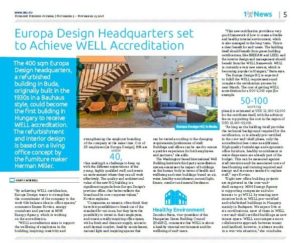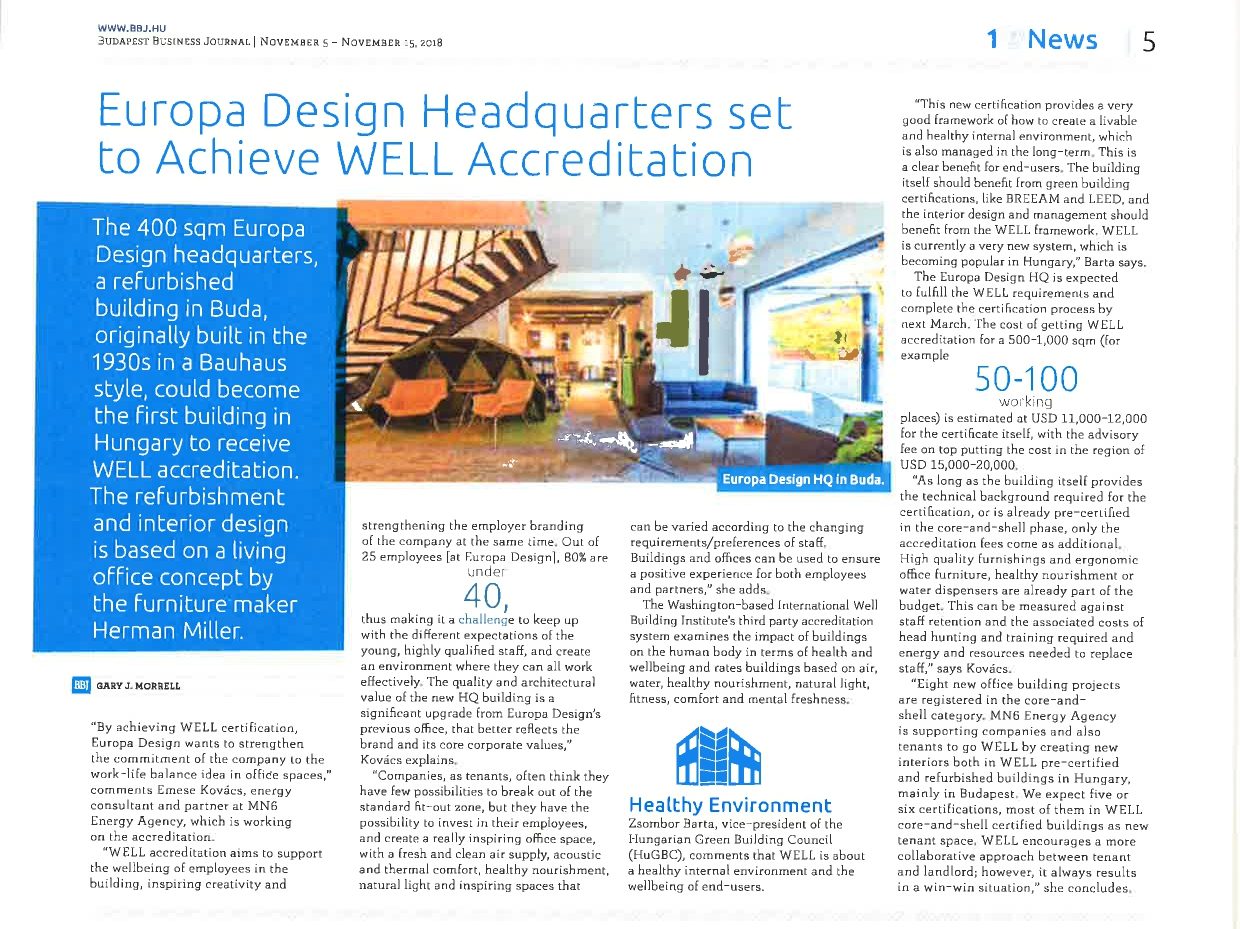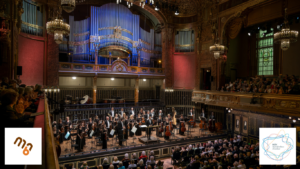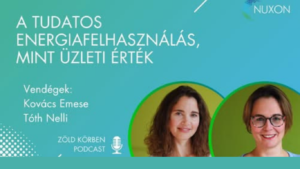Our interview was published in the Budapest Business Journal.
 The 400 sqm Europa Design headquarters, a refurbished building in Buda, originally built in the 1930s in a Bauhaus style, could become the first building in Hungary to receive WELL accreditation. The refurbishment and interior design is based on a living office concept by the furniture maker Herman Miller.
The 400 sqm Europa Design headquarters, a refurbished building in Buda, originally built in the 1930s in a Bauhaus style, could become the first building in Hungary to receive WELL accreditation. The refurbishment and interior design is based on a living office concept by the furniture maker Herman Miller.
“By achieving WELL certification, Europa Design wants to strengthen the commitment of the company to the work-life balance idea in office spaces,” comments Emese Kovács, energy consultant and partner at MN6 Energy Agency, which is working on the accreditation. “WELL accreditation aims to support the wellbeing of employees in the building, inspiring creativity and strengthening the employer branding of the company at the same time. Out of 25 employees [at Europa Design], 80% are under 40, thus making it a challenge to keep up with the different expectations of the young, highly qualified staff, and create an environment where they can all work effectively. The quality and architectural value of the new HQ building is a significant upgrade from Europa Design’s previous office, that better reflects the brand and its core corporate values,” Kovács explains. “Companies, as tenants, often think they have few possibilities to break out of the standard fit-out zone, but they have the possibility to invest in their employees, and create a really inspiring office space, with a fresh and clean air supply, acoustic and thermal comfort, healthy nourishment, natural light and inspiring spaces that can be varied according to the changing requirements/preferences of staff. Buildings and offices can be used to ensure a positive experience for both employees and partners,” she adds. The Washington-based International Well Building Institute’s third party accreditation system examines the impact of buildings on the human body in terms of health and wellbeing and rates buildings based on air, water, healthy nourishment, natural light, fitness, comfort and mental freshness.
Healthy Environment
Zsombor Barta, vice-president of the Hungarian Green Building Council (HuGBC), comments that WELL is about a healthy internal environment and the wellbeing of end-users. “This new certification provides a very good framework of how to create a livable and healthy internal environment, which is also managed in the long-term. This is a clear benefit for end-users. The building itself should benefit from green building certifications, like BREEAM and LEED, and the interior design and management should benefit from the WELL framework. WELL is currently a very new system, which is becoming popular in Hungary,” Barta says. The Europa Design HQ is expected to fulfill the WELL requirements and complete the certification process by next March. The cost of getting WELL accreditation for a 500-1,000 sqm (for example 50-100 working places) is estimated at USD 11,000-12,000 for the certificate itself, with the advisory fee on top putting the cost in the region of USD 15,000-20,000. “As long as the building itself provides the technical background required for the certification, or is already pre-certified in the core-and-shell phase, only the accreditation fees come as additional. High quality furnishings and ergonomic office furniture, healthy nourishment or water dispensers are already part of the budget. This can be measured against staff retention and the associated costs of head hunting and training required, and energy and resources needed to replace staff,” says Kovács. “Eight new office building projects are registered in the core-and shell category. MN6 Energy Agency is supporting companies and also tenants to go WELL by creating new interiors both in WELL pre-certified and refurbished buildings in Hungary, mainly in Budapest. We expect five or six certifications, most of them in WELL core-and-shell certified buildings as new tenant space. WELL encourages a more collaborative approach between tenant and landlord; however, it always results in a win-win situation,” she concludes.
Gary J. Morrell
Budapest Business Journal, vol. 26. number 20, 2018
[:en]
Our interview was published in the Budapest Business Journal.
 The 400 sqm Europa Design headquarters, a refurbished building in Buda, originally built in the 1930s in a Bauhaus style, could become the first building in Hungary to receive WELL accreditation. The refurbishment and interior design is based on a living office concept by the furniture maker Herman Miller.
The 400 sqm Europa Design headquarters, a refurbished building in Buda, originally built in the 1930s in a Bauhaus style, could become the first building in Hungary to receive WELL accreditation. The refurbishment and interior design is based on a living office concept by the furniture maker Herman Miller.
“By achieving WELL certification, Europa Design wants to strengthen the commitment of the company to the work-life balance idea in office spaces,” comments Emese Kovács, energy consultant and partner at MN6 Energy Agency, which is working on the accreditation. “WELL accreditation aims to support the wellbeing of employees in the building, inspiring creativity and strengthening the employer branding of the company at the same time. Out of 25 employees [at Europa Design], 80% are under 40, thus making it a challenge to keep up with the different expectations of the young, highly qualified staff, and create an environment where they can all work effectively. The quality and architectural value of the new HQ building is a significant upgrade from Europa Design’s previous office, that better reflects the brand and its core corporate values,” Kovács explains. “Companies, as tenants, often think they have few possibilities to break out of the standard fit-out zone, but they have the possibility to invest in their employees, and create a really inspiring office space, with a fresh and clean air supply, acoustic and thermal comfort, healthy nourishment, natural light and inspiring spaces that can be varied according to the changing requirements/preferences of staff. Buildings and offices can be used to ensure a positive experience for both employees and partners,” she adds. The Washington-based International Well Building Institute’s third party accreditation system examines the impact of buildings on the human body in terms of health and wellbeing and rates buildings based on air, water, healthy nourishment, natural light, fitness, comfort and mental freshness.
Healthy Environment
Zsombor Barta, vice-president of the Hungarian Green Building Council (HuGBC), comments that WELL is about a healthy internal environment and the wellbeing of end-users. “This new certification provides a very good framework of how to create a livable and healthy internal environment, which is also managed in the long-term. This is a clear benefit for end-users. The building itself should benefit from green building certifications, like BREEAM and LEED, and the interior design and management should benefit from the WELL framework. WELL is currently a very new system, which is becoming popular in Hungary,” Barta says. The Europa Design HQ is expected to fulfill the WELL requirements and complete the certification process by next March. The cost of getting WELL accreditation for a 500-1,000 sqm (for example 50-100 working places) is estimated at USD 11,000-12,000 for the certificate itself, with the advisory fee on top putting the cost in the region of USD 15,000-20,000. “As long as the building itself provides the technical background required for the certification, or is already pre-certified in the core-and-shell phase, only the accreditation fees come as additional. High quality furnishings and ergonomic office furniture, healthy nourishment or water dispensers are already part of the budget. This can be measured against staff retention and the associated costs of head hunting and training required, and energy and resources needed to replace staff,” says Kovács. “Eight new office building projects are registered in the core-and shell category. MN6 Energy Agency is supporting companies and also tenants to go WELL by creating new interiors both in WELL pre-certified and refurbished buildings in Hungary, mainly in Budapest. We expect five or six certifications, most of them in WELL core-and-shell certified buildings as new tenant space. WELL encourages a more collaborative approach between tenant and landlord; however, it always results in a win-win situation,” she concludes.
Gary J. Morrell
Budapest Business Journal, vol. 26. number 20, 2018
[:]




